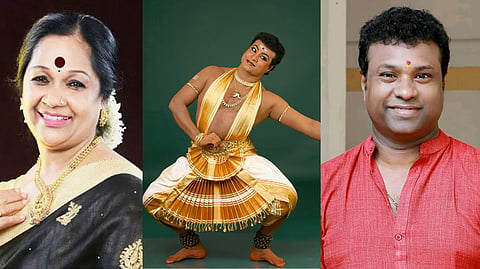

KOCHI: Despite claims of being progressive, caste and class discrimination and racism thrive in Kerala’s cultural sphere. The latest incident that reared the ugly face of society were remarks made by mohiniyattam artist Kalamandalam Satyabhama on Thursday, who tried to liken a Dalit male artist to a crow denigrating his complexion.
Though R L V Ramakrishnan is a renowned artist with a PhD in mohiniyattam, he was forced to raise his voice against discrimination on multiple occasions. General society in Kerala has always been reluctant to accept artists who do not belong to the high castes.
Classical art forms like kathakali, bharatanatyam, mohiniyattam, koodiyattam, chakyar koothu and Carnatic music have remained the domain for forward castes even 75 years after Independence. The practice of discrimination is prevalent more in districts north of Ernakulam, while temples in the south are more accommodating, says a Dalit artist.
Kerala witnessed a major controversy when the thantri of Thriprayar Sree Rama temple denied permission for a performance of Gurudeva Mahatmyam, a kathakali play depicting the life of Sree Narayana Guru, on the temple premises. This hurt the emotions of the Ezhava community, which worships the Guru as god. Most kathakali performers belong to the Namboothiri and Nair communities and the classical dance forms continue to be a no-go zone for lower castes.
Actors like Vinayakan have often revolted against the discrimination against Dalit artists in Mollywood.
Actor Manikandan Achary took to the Facebook, reminding Satyabhama that the age when elites decide what others should do is over. “We are humans. We are born and brought up in this land. We are artists and this is our identity. We will sing, dance and act. People who are interested in our performance will watch. The age when you decided on the role of others is over,” he wrote.
“Casteism and racist mentality exists in Kerala’s society and I have experienced it over the years,” says Dalit folk singer Praseetha Chalakudy.
“I now have gained respect in society, but I earned it after much struggle. It is hard for a Dalit artist to find space in the cultural sphere. Even now people refer to my caste when hurling abuses on social media. Though I get better pay nowadays, folk singers generally are not treated on par with other artists,” she said.
“The question is how you judge an art performance - by talent or by complexion,” said political observer J Prabhash. “Our belief that casteism has been wiped out from Kerala society has been proved wrong. It was lying dormant. The resurgence of Hindutva has legitimised casteist mentality. It is against this context that casteist aspersions are returning to the society. It is disgusting that people are openly endorsing caste even 75 years after Independence. This indicates where we are progressing as a society. The experience of R L V Ramakrishnan proves that the Dronacharya syndrome, where the Dalit who enters domains held by elites are punished, still exists in the society. We have to defeat this mentality,” he said.
Most of the temples prefer percussion artists belonging to the Marar and Poduval communities to perform panchavadyam. Even Kerala Kalamandalam did not accept students from other communities to pursue percussion courses till recently.
A Nair, Biju Sopanam was denied appointment by Cochin Devaswom Board as only Marar or Poduval community members can be sopanam singers. “I was a sopanam artist at CDB’s Cheranalloor Bhagavathy temple from 2010. But in 2012, my application for a permanent post was rejected. I continue performing on stage but many temples deny me opportunity to sing in front of the sanctum sanctorum,” says Biju.
Chakyar koothu artist Elavoor Anil, who also belongs to the Nair community, says major temples do not allow him to perform on their premises as he does not belong to Chakiar community, which is a sub-sect of the Brahmin community. “I performed at Thiruvaloor Mahadeva temple in Ernakulam for 19 years. In 2016, the temple administration asked me to perform padakam instead of chakyar koothu. When I sought the reason, authorities said it was found in devaprasnam, the ritual to know the mind of the deity, that a chakiar should perform chakyar koothu,” he said.
Mansiya V P, a bharatanatyam dancer who renounced her Muslim faith fighting discrimination, struggles to find acceptance at temples as she has refused to convert to Hinduism. In March 2022, Koodalmanikyam temple in Thrissur cancelled her performance at the National Festival of Dance and Music as she failed to produce a certificate that she is a practising Hindu.
A native of Malappuram district, Mansiya renounced Islam after the community denied a burial place for her mother Amina, whose daughters are all dancers. Though she married a Hindu, Koodalmanikyam temple demanded that she should declare her religion to perform on its premises. As she refused, Mansiya’s programme was cancelled. Saumya Sukumaran, a Christian bharatanatyam dancer who married a Hindu was also denied the opportunity on religious grounds at Koodalmanikyam temple in 2022.
Instances of caste discrimination
Kalamandalam did not admit students belonging to lower castes for courses like kathakali, chenda and maddalam till the last decade
Actors in Malayalam film industry like Vinayakan and Manikandan Achary struggle to survive in the caste-dominated industry
2013 Permission denied for performance of Gurudeva Charitham kathakali at Triprayar Sree Rama Temple
Classical art forms like kathakali, koodiyattam, bharatanatyam, mohiniyattam, chakyar koothu remain a domain for upper castes
Temples prefer chakyar koothu performers from Chakyar community, a sub-sect of Brahmins
Artists belonging to Poduval and Marar communities selected to perform melam at temples
Only Marar and Poduval can perform Sopana sangee-tham in front of sanctum sanctorum
Dalit folk singers face discrimination at temple festivals. Payment lower than other art forms
Mansiya who renounced Islam and married a Hindu denied opportunity at temples as she has refused to convert to Hinduism